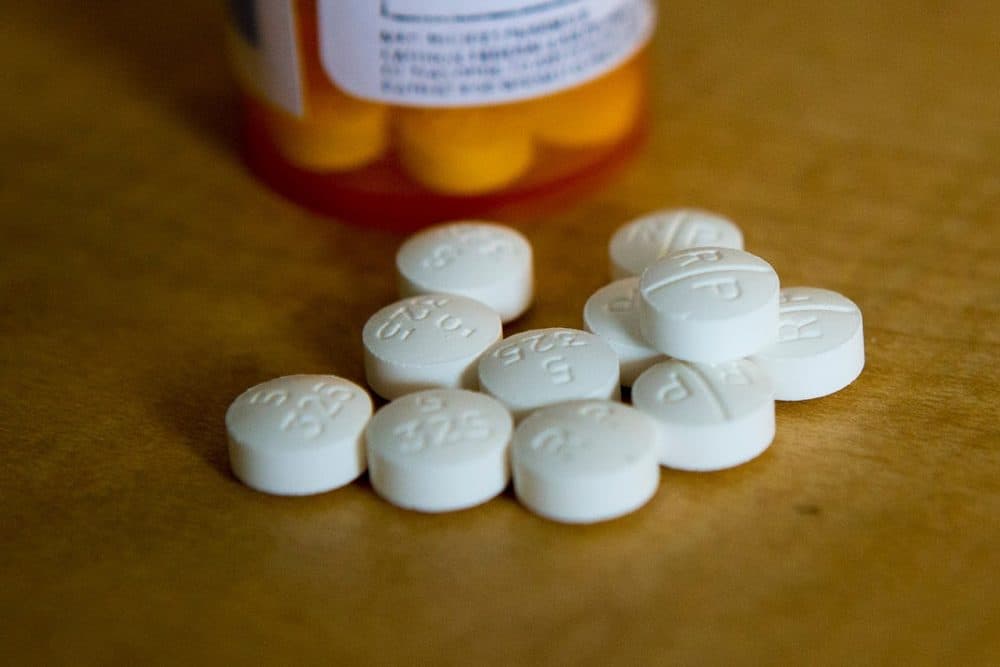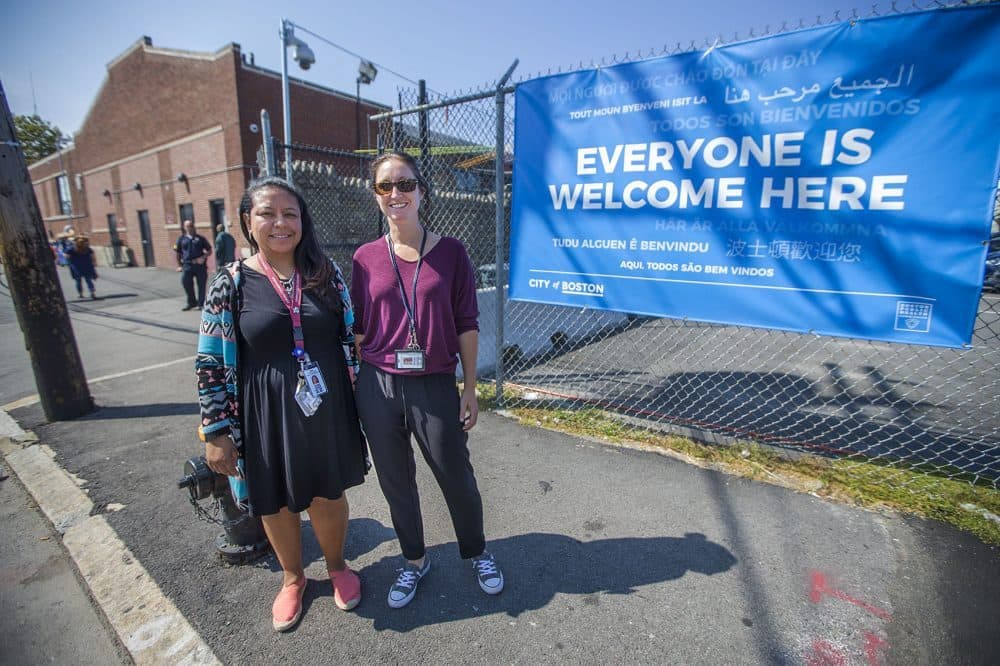Advertisement
In Mayoral Race, Disagreement Over Boston's Approach To Tackling Opioid Crisis

Just a few months after Boston Mayor Marty Walsh was elected four years ago, the state declared the opioid crisis an emergency.
Walsh said because of his personal experience in recovery, he was well-suited to help address the epidemic. But now as he seeks re-election, some say his actions have made matters worse.
"My name is Marty Walsh, and I'm an alcoholic," he told delegates at the 2016 Democratic National Convention.
Many expected this personal experience would translate into policies that would be sympathetic to the recovery community and help deal with the ever-growing opioid epidemic.
Walsh did take several steps: He established an Office of Recovery Services to coordinate some of the efforts to address the epidemic; he announced the city's 311 phone line would allow people struggling with addiction to be connected with recovery services; he expanded emergency responders' use of the overdose reversal drug naloxone; and he invested additional resources in the PAATHS (Providing Access to Addiction Treatment Hope and Support) program that helps people get into treatment.
The Bridge Closure, And The Fallout
But a crisis erupted during the mayor's first year in office that some say overshadows all of that. In October 2014, the mayor closed the bridge to Long Island in Boston Harbor because it was unsafe. That shuttered several social service programs on the island for the homeless and those struggling with substance use. At the time Walsh promised to quickly restore the lost beds.
"I'm going to make sure there is a place for everyone to be — we're looking right now. We had to move 500 people off the island last night," Walsh told reporters.
Advertisement
But that was not easy and it took time — so much so that may social service advocates criticized Walsh's response. That criticism has continued in this year's mayoral race.
Although the number of beds that were on Long Island has now been restored, Walsh's opponent, City Councilor Tito Jackson, said the way Walsh handled the bridge closure shows an insensitivity to the city's vulnerable residents.
"We have a mayor who closed the bridge ... with no forethought about what was going to happen," Jackson said.
If elected, Jackson said he would reopen the island and fund more treatment, more housing for those in recovery and more law enforcement diversion programs to try to make progress on the opioid problem.
"We actually have gone backwards rather than forward on this issue. You don't have to ask me, you can go to Mass. Ave. and Melnea Cass [Boulevard] and see the legacy of Mayor Walsh," Jackson said.

Addressing Needs Along 'Methadone Mile'
That intersection Jackson referenced is the center of what some have called "Methadone Mile" — although Mayor Walsh dislikes that term. Boston Medical Center, several treatment programs, methadone clinics and homeless shelters attract thousands of people to the area every day. Dozens of people congregate daily on street corners.
"They were all deposited here by ill-conceived public policy," said Jim Stewart of the Boston Homeless Solidarity Committee. "A substantial number of them wound up getting deposited here after the Long Island bridge got condemned. It's created like a free trade zone for substance use."
Stewart added that he believes the result of Walsh's efforts in the area "certainly doesn't justify the mayor trying to portray himself as a leader around this issue."
But the Walsh administration says the mayor has been innovative. It points out initiatives like the new so-called engagement center in this neighborhood. That's a place where people drop in during the day to get inside, use restrooms, and get information about treatment. Last month alone, the center recorded 21,000 visits.
"It doesn't matter how many people he's got sitting behind a screen with a headphone on taking phone calls. If there aren't places to refer people it's all just a public relations gimmick."
Jim Stewart, Boston Homeless Solidarity Committee
His administration also cited the hiring of outreach workers instructed to walk the streets and inform people of treatment services, as well as increased efforts to clean up used syringes with a Mobile Sharps team. The team collected 18,000 improperly discarded syringes off Boston streets in the past year.
Still, critics like Stewart say expanding long-term treatment and addiction medication should be the city's focus.
"It doesn't matter how many people he's got sitting behind a screen with a headphone on taking phone calls. If there aren't places to refer people it's all just a public relations gimmick," Stewart said.
Some of the mayor's initiatives came about after area business leaders with the Newmarket Business Association complained about people loitering or sleeping near businesses and nodding off in the streets.
"I think it's gotten worse. If you leave this office at 5 o'clock at night and you see what's going on, it's no better," said Joan Libby, CEO and president of Cavalier Coach Trailways on Mass. Ave. But Libby says that's not because of Walsh.
"The mayor has tried very, very hard, and I think he has done a good job but I think what they need to do is open the island again," she said. "[Then] all the services that they need are at least in one spot."
In Walsh's Initiatives, Some See Progress
Walsh said at some point he would like to rebuild the Long Island Bridge and open recovery programs there, but that he does not believe that will solve the problem.
"This isn't going to be a government fix, this is a community fix. Pointing finger at one person isn't the answer," Walsh said. "The Long Island Bridge closure has nothing to do with the rise in opioid use — that has nothing to do with it. That just shows you my opponent doesn't completely understand the epidemic that we're talking about."
"I've known the mayor for a long time. When I hear people throwing rocks at him on this issue, it disturbs me, because I know how much he cares."
John McGahan, CEO of The Gavin Foundation
Many treatment providers in the city have said the mayor has done a good job. John McGahan, president and CEO of The Gavin Foundation, one of the largest providers of long-term addiction treatment programs in Boston, said it's not fair to blame Walsh for an issue he's advocated for throughout his career.
"I've known the mayor for a long time. When I hear people throwing rocks at him on this issue, it disturbs me, because I know how much he cares," McGahan said. "So for someone to take cheap shots at a guy who has dedicated as much time and effort — it's despicable."
The city's health commission has spent more than $14 million on recovery programs since Walsh took office.
During that time, the overdose death rate in Boston doubled.
Share your experiences, and follow along with our reporters as they cover opioid use and treatment, by joining our Facebook group, "Living The Opioid Epidemic."
This article was originally published on November 06, 2017.
This segment aired on November 6, 2017.
